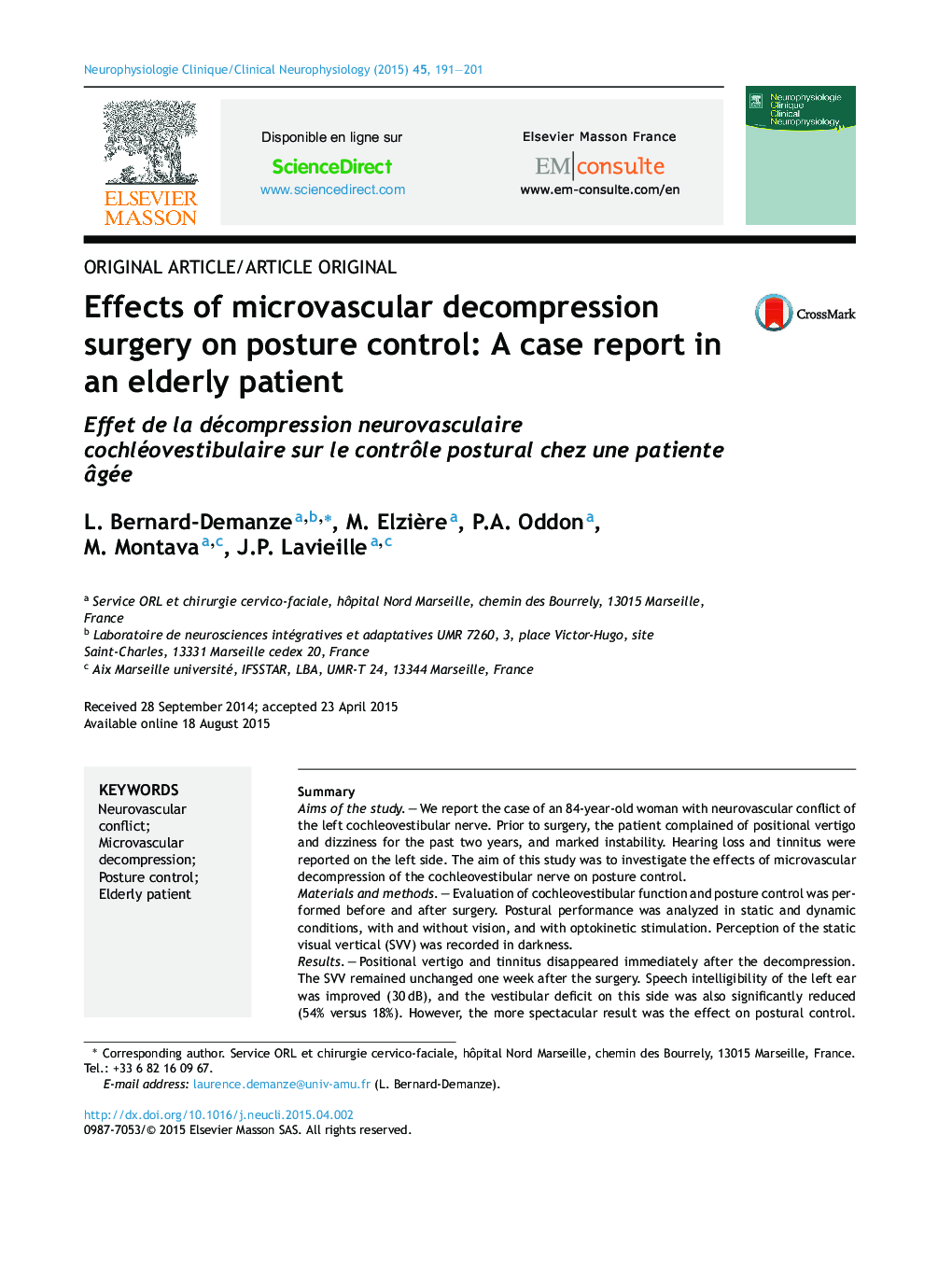| Article ID | Journal | Published Year | Pages | File Type |
|---|---|---|---|---|
| 3082274 | Neurophysiologie Clinique/Clinical Neurophysiology | 2015 | 11 Pages |
SummaryAims of the studyWe report the case of an 84-year-old woman with neurovascular conflict of the left cochleovestibular nerve. Prior to surgery, the patient complained of positional vertigo and dizziness for the past two years, and marked instability. Hearing loss and tinnitus were reported on the left side. The aim of this study was to investigate the effects of microvascular decompression of the cochleovestibular nerve on posture control.Materials and methodsEvaluation of cochleovestibular function and posture control was performed before and after surgery. Postural performance was analyzed in static and dynamic conditions, with and without vision, and with optokinetic stimulation. Perception of the static visual vertical (SVV) was recorded in darkness.ResultsPositional vertigo and tinnitus disappeared immediately after the decompression. The SVV remained unchanged one week after the surgery. Speech intelligibility of the left ear was improved (30 dB), and the vestibular deficit on this side was also significantly reduced (54% versus 18%). However, the more spectacular result was the effect on postural control. This elderly patient improved her postural balance in both static and dynamic conditions, and became able to maintain her equilibrium in the more challenging dynamic conditions, with and without vision, as early as one week after the surgery, a postural performance that she had been unable to do preoperatively.ConclusionThis work is the first to show that the postural deficits resulting from neurovascular conflict of the cochleovestibular nerve are strongly improved after microvascular decompression.
RésuméBut de l’étudeDans le spasme hémifacial et la névralgie du trijumeau, l’efficacité de la décompression neurovasculaire dans l’angle ponto-cérébelleux est bien reconnue à ce jour. Nous rapportons ici le cas d’une femme de 84 ans présentant un conflit neurovasculaire du nerf cochléovestibulaire gauche. La patiente a consulté pour des crises de vertige et des instabilités posturales invalidantes, accompagnées d’une hypoacousie gauche et d’un acouphène gauche. La chirurgie de décompression neurovasculaire a été réalisée par voie rétro-sigmoïdienne assistée par endoscopie.Matériel et méthodeLa patiente a été examinée avant et après chirurgie (7 jours et 2 mois) en conditions statique et dynamique d’équilibration (plateforme stable versus instable), avec et sans vision, et avec stimulation optocinétique. Une évaluation de la verticale visuelle subjective (VVS) et un examen de la fonction cochléovestibulaire ont été aussi réalisés avant et après chirurgie.RésultatsAvant décompression, l’examen posturographie mettait en évidence des instabilités posturales en conditions statique et dynamique, majorées en absence de vision et avec stimulation optocinétique, conditions conduisant à la chute de la patiente. En postopératoire immédiat (7 jours) et à plus long terme (2 mois), l’équilibre postural était possible en condition dynamique ainsi qu’en absence de vision. L’analyse des paramètres posturographies (énergie, puissance spectrale) ne montrait plus de différences significatives par rapport aux normes de sujets de même âge. La VVS n’était pas affectée par la décompression. Les vertiges et l’acouphène gauche avaient totalement disparu. L’intelligibilité était améliorée à gauche et le déficit vestibulaire gauche était fortement réduit (54 % versus 18 %).ConclusionCe travail est le premier à montrer que les déficits posturaux, résultant d’un conflit neurovasculaire du nerf cochléovestibulaire chez une personne âgée, sont améliorés après chirurgie de décompression.
